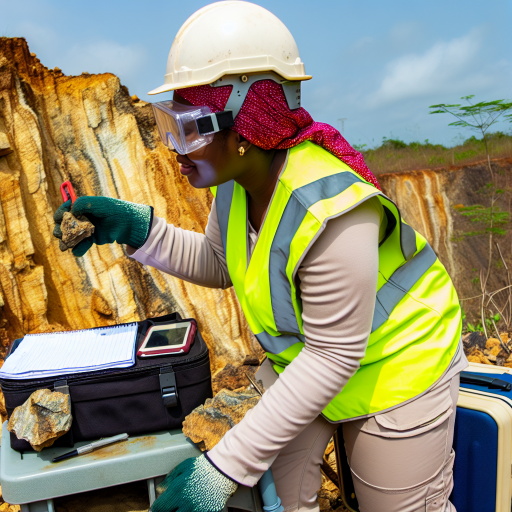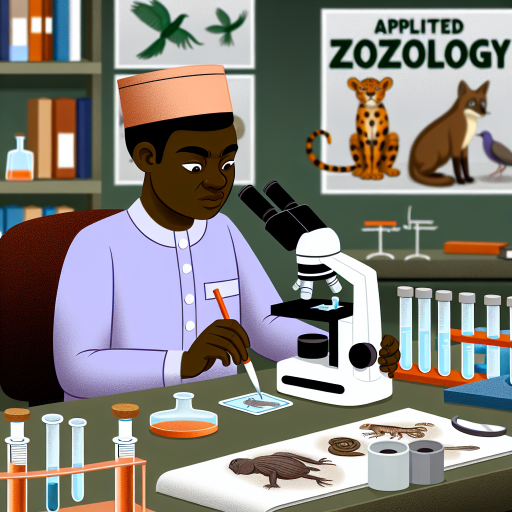Introduction:
Climate change refers to the long-term alteration in Earth’s climate and weather patterns due to human activities.
In Nigerian environmental biology, climate change studies are crucial for understanding how it impacts ecosystems, biodiversity, and human health.
These studies help researchers and policymakers develop strategies to mitigate the negative effects of climate change on the environment and society.
By analyzing data on temperature, rainfall patterns, and greenhouse gas emissions, scientists can predict future changes and take proactive measures to adapt to them.
In Nigeria, climate change studies in environmental biology are essential for addressing issues such as desertification, deforestation, loss of biodiversity, and water scarcity.
By monitoring these changes and their impacts on the ecosystem, researchers can propose conservation measures and sustainable practices to protect the environment for future generations.
Moreover, understanding the effects of climate change on agricultural systems is crucial for ensuring food security in Nigeria.
By studying how changing climate patterns affect crop yields, researchers can develop resilient farming techniques and crop varieties that can withstand extreme weather conditions.
Overall, climate change studies in Nigerian environmental biology play a vital role in creating awareness about the importance of sustainable practices and policies.
By conducting research in this field, scientists can inform decision-makers and empower communities to take action to safeguard the environment and promote a healthier and more sustainable future.
Overview of Current Climate Change Situation in Nigeria:
Climate change is a pressing issue affecting Nigeria.
Drastic changes in temperature and precipitation patterns are evident.
Key Factors Contributing to Climate Change in Nigeria:
Factors like deforestation, industrial emissions, and reliance on fossil fuels are major contributors to climate change in Nigeria.
Statistics on Environmental Degradation and Climate-Related Disasters in Nigeria:
According to reports, Nigeria has experienced a significant increase in flooding, desertification, and land degradation due to climate change.
Climate change in Nigeria has been exacerbated by human activities.
These include deforestation and industrial emissions, leading to severe environmental degradation.
Climate-related disasters are increasing.
The current situation calls for urgent action to mitigate the impact on the country’s environment and people.
Deforestation is driven by agriculture, logging, and urban expansion.
This loss of crucial forest cover contributes to greenhouse gas emissions.
It disrupts local ecosystems as well.
Industrial emissions from factories, power plants, and vehicles are significant contributors to climate change.
Nigeria’s reliance on fossil fuels for energy production has resulted in high levels of carbon dioxide emissions.
This worsens the global climate crisis.
Natural factors like volcanic eruptions and solar radiation variations also play a role in climate change.
However, anthropogenic factors are currently driving the rapid changes in Nigeria’s climate.
The consequences of climate change in Nigeria are evident in the increasing frequency and intensity of extreme weather events.
Flooding, droughts, and heatwaves have become more common.
These events impact agriculture, water resources, and human health.
Environmental degradation in Nigeria is alarming.
Reports indicate a loss of biodiversity, soil erosion, and pollution.
These challenges are directly linked to climate change.
Statistics show that Nigeria has experienced a significant increase in climate-related disasters in recent years.
From 2010 to 2020, the country witnessed a 50% rise in flooding events.
This increase has caused displacement and economic losses for communities across the nation.
Desertification is another pressing issue in Nigeria.
Approximately 35% of the country’s land area is affected.
The expansion of arid lands due to deforestation, overgrazing, and poor land management practices has led to soil degradation.
This reduces agricultural productivity.
In response to these challenges, the Nigerian government has taken steps to address climate change.
Transform Your Career with Expert Guidance
Get personalized mentorship consulting that’s tailored to your unique path. Our expert advice is actionable and exclusive.
Get StartedPolicy initiatives and international partnerships are underway.
The country is committed to reducing greenhouse gas emissions.
It aims to promote renewable energy and enhance climate resilience in vulnerable sectors.
Overall, climate change studies in Nigerian environmental biology are crucial.
These studies help understand the complex interactions between human activities, environmental degradation, and climate variability.
By identifying key factors and implementing sustainable solutions, Nigeria can mitigate the impact of climate change.
Role of environmental biology in climate change studies:
Environmental biology studies ecosystems and their response to climate change.
It focuses on how organisms interact with and adapt to changing environmental conditions.
By studying biodiversity, researchers can assess the impact of climate change on different species.
Importance of understanding the biological impacts of climate change in Nigeria:
- Nigeria is vulnerable to the effects of climate change due to its geographical location and diverse ecosystems.
- Understanding biological impacts can help in developing conservation strategies for endangered species.
- It can also aid in predicting and mitigating the spread of diseases that thrive in changing climates.
- By studying the biological response to climate change, policymakers can make informed decisions about land use and resource management.
- Environmental biology plays a crucial role in shaping climate change policies and conservation efforts in Nigeria.
Gain More Insights: Applied Biology Curriculum in Nigerian Universities
Research methods and approaches in climate change studies:
Various methodologies are employed in studying climate change in Nigerian environmental biology.
One common approach is the collection of meteorological data to analyze trends over time.
Remote sensing techniques are also utilized to monitor changes in land use and vegetation cover.
Field surveys and experiments help scientists understand the impacts of climate change on biodiversity.
Climate models are used to predict future scenarios and assess the potential risks of global warming.
Discuss methodologies used in studying climate change in Nigerian environmental biology:
- Interviews and questionnaires are conducted to gather information from local communities about climate change impacts.
- Genetic analysis is used to study the adaptations of species to changing environmental conditions.
- GIS mapping helps researchers visualize spatial patterns of climate variables and their effects on ecosystems.
- Water quality monitoring is essential to understand the impact of climate change on aquatic ecosystems.
- Collaborative studies with stakeholders provide valuable insights into the socio-economic aspects of climate change.
Highlight ongoing research projects and collaborations in the field:
- The Nigerian Climate Change Study Group is actively conducting research on climate change impacts in the country.
- Collaborations with international organizations such as the UNDP and WHO enhance research efforts in climate change studies.
- Research projects on water management and biodiversity conservation are in collaboration with local universities and government agencies.
- Agricultural research institutions in Nigeria are working on drought-resistant crops to mitigate the effects of climate change.
- Public-private partnerships are being formed to develop sustainable solutions for climate change adaptation and mitigation.
You Might Also Like: Top Universities Offering Bioinformatics in Nigeria
Case Studies of Climate Change Impacts on Nigeria’s Biodiversity
Climate change is a pressing issue that has significant impacts on biodiversity in Nigeria.
Here are some examples of how climate change is affecting flora and fauna in the country:
- Shifts in habitats: Rising temperatures and changing rainfall patterns are causing shifts in habitats which are affecting the distribution of plant and animal species.
- Migration patterns: Some species are being forced to migrate to higher elevations or move to different regions in search of suitable conditions, leading to disruptions in ecosystems.
- Species extinction: Climate change is pushing some species to the brink of extinction as they struggle to adapt to rapid changes in their environment.
- Altered breeding seasons: Changes in temperature and rainfall are disrupting the breeding seasons of many species, impacting their reproductive success.
- Invasive species: Warmer temperatures are allowing invasive species to thrive, outcompeting native species and further threatening biodiversity.
Implications for Conservation Efforts and Ecosystem Resilience
The implications of climate change on biodiversity in Nigeria have far-reaching consequences for conservation efforts and ecosystem resilience:
- Risk to endemic species: Endemic species that are unique to Nigeria are at higher risk of extinction due to their limited geographical range and specific habitat requirements.
- Loss of ecosystem services: Changes in biodiversity can lead to a loss of essential ecosystem services such as pollination, soil fertility, and water purification, impacting human well-being.
- Threat to food security: Loss of biodiversity can disrupt food chains and reduce the availability of food resources, posing a threat to food security for communities dependent on natural resources.
- Increased vulnerability to disasters: Weakened ecosystems are more vulnerable to extreme weather events and natural disasters, exacerbating the impact of climate change on communities.
- Need for adaptive management: Conservation efforts need to adapt to changing environmental conditions by implementing strategies that enhance ecosystem resilience and promote the survival of species in the face of climate change.
Climate change is a significant threat to biodiversity in Nigeria, with far-reaching implications for conservation efforts and ecosystem resilience.
It is crucial for stakeholders to prioritize conservation efforts and implement adaptive management strategies to mitigate the impacts of climate change on Nigeria’s flora and fauna.
See Related Content: The Role of Zoology in Nigeria’s Environmental Conservation

Policy Implications and Recommendations:
Identify current policies addressing climate change in Nigeria:
- The National Climate Change Policy was developed in 2012 to address climate change issues in Nigeria.
- The policy focuses on promoting sustainable development, reducing emissions, and increasing resilience to climate change.
- The Nigerian Climate Change Adaptation Strategy and Programme of Action (NCCASPA) is another key policy document.
- NCCASPA aims to enhance Nigeria’s adaptive capacity and resilience to climate change impacts in various sectors.
- The Nationally Determined Contributions (NDCs) outline Nigeria’s commitments to reducing greenhouse gas emissions by 2030.
- These policies provide a framework for addressing climate change challenges and promoting sustainable development in Nigeria.
Offer recommendations for policymakers, researchers, and the general public to mitigate the effects of climate change in Nigerian environmental biology:
- Policymakers should integrate climate change considerations into all sectors and develop robust adaptation strategies.
- Implementing climate-smart agricultural practices can enhance food security and resilience to climate change impacts.
- Promote renewable energy sources to reduce greenhouse gas emissions and mitigate climate change effects.
- Enhance public awareness on climate change impacts and the importance of conservation and sustainable practices.
- Encourage research collaborations to enhance understanding of climate change impacts on Nigerian environmental biology.
- Support community-based initiatives that promote sustainable land use practices and ecosystem conservation.
Uncover the Details: Professional Bodies for Geophysicists in Nigeria
Implications of Climate Change on Nigeria’s Ecosystem
Climate change studies in Nigerian environmental biology are crucial for understanding the impacts on the ecosystem.
Researchers have highlighted significant changes in temperature, precipitation patterns, and biodiversity in Nigeria.
The studies have emphasized the need for sustainable environmental practices and policies to mitigate the adverse effects.
Continued research is essential to develop targeted strategies for adaptation and mitigation in Nigerian environmental biology.
It is imperative that stakeholders, policymakers, and the scientific community work together to address the challenges posed by climate change.
By translating research findings into actionable initiatives, we can protect our environment and ensure a sustainable future for generations to come.
Additional Resources
Participatory modelling for climate change adaptation: the poultry …
Patriarchy and Women Vulnerability to Adverse Climate Change in …




